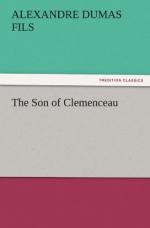“The time of my giving you the proof of trust should make it more sacred and precious still. I have found the solution of the last problem over which we pored. You know that while we discovered the means of imprisoning the gas in a concentrated form of scarcely appreciable bulk, it was not always our obedient slave, we had the fear that sometimes it would not submit to being liberated by piecemeal but would now and then disrupt its containing chamber in impatience, and then the holder would certainly die, choked if the fragments of the gun had not fatally lacerated him. After many days and nights, I have found the simple means to render the gas innocuous except in the direction to which we direct its flow. I have written out the formula, in the minutest particulars and in the cipher which you and I alone understand. In the same way we two share the secret of this safe.”
He handed Antonino a peculiar key and he went to unlock the coffer which had aroused Madame Clemenceau’s curiosity.
“Lock it up with the other papers,” concluded the inventor. “I appoint you its keeper while I live—my heir and the carrier out of the work after my decease, should I die before having proved what I consign there. What matters it now if my material form disappears when my spirit lives on in thee! Well,” he said, as Antonino returned, after closing and fastening the chest, “do you need any farther proof of the confidence I have in you?”
Antonino grasped his hand and wrung it fondly When both had recovered calmness, they went on speaking of their work, which might be considered past the stage when the projector is racked by misgivings. They went into the breakfast-room together, prepared to bear the singular meeting with the errant wife whose return was so unexpected. But she preferred not to take the step so soon, and, as Rebecca also kept away, warned by Hedwig, who might appear at the board, the three men took their meal together.
CHAPTER XV.
THE MAN OF MANY MASKS.
From dawn a stranger had been wandering about Montmorency. Armed with a large sun-umbrella and a Guid-Joanne, his copiously oiled black side-whiskers glistening in the sun, showing large teeth in a friendly grin to wayfarers of all degrees, one did not need to hear his strong accent of the people of Marseilles to know that he was a son of the South. Probably having made a fortune in shipping, in oils or wines, he was utilizing his holiday by touring in the north of his country, forced to admire, but still pugnaciously asseverating that no garden equalled his city park and no main street his Cannebiere. He seemed to have no destination in particular; he stopped here and there at random, and used a large and powerful field-glass, slung by a patent leather strap over his brawny shoulders, to study the points in the wide landscape. Now and then he made notes in his guide-book, but with a good-humored listlessness which would have disarmed the most suspicious of military detectives. On descending the hillside, he did not scruple to stop to chat with a nurse maid or two out with the children, and to open his hand as freely to give the latter some silver as he had opened his heart to the girl—all with an easy, hearty laugh, and the oily accent of his fellow-countrymen.




